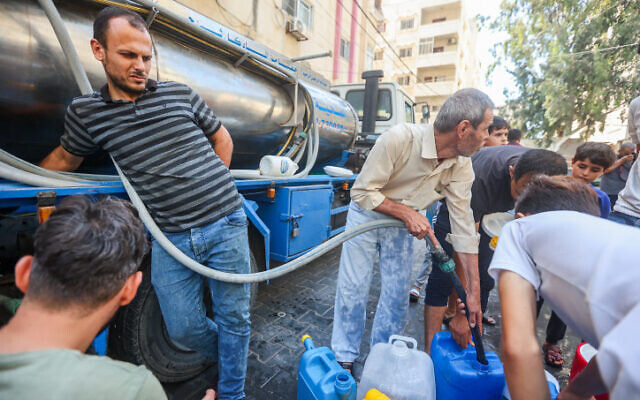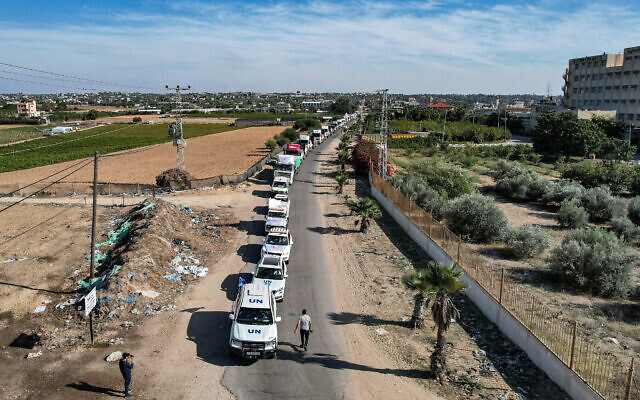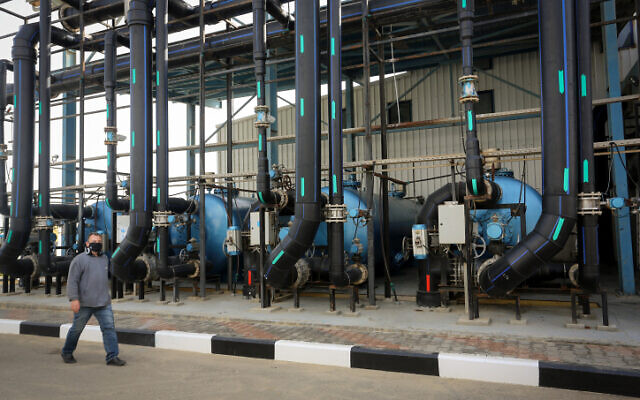Israel Reopens Second of Three Water Pipelines into Gaza
Israeli liaison says the territory is receiving 28.5 million liters of potable water a day, insists there is ‘no shortage’ of food.

Israel has reopened the second of three water pipelines that provide water to the Gaza Strip, allowing for a total of 28.5 million liters a day to flow into the Hamas-run territory from Israel, according to the Israeli military liaison to the Palestinian territory.
IDF Col. Elad Goren, who heads the civilian department of the Coordinator of Government Activities in the Territories (COGAT), announced on Sunday that the second pipeline was reopened on Saturday.
The supply of a total of 28.5 million liters of potable water a day is just over half the approximately 49 million liters a day Israel supplied before Hamas’s Oct. 7 massacres triggered war with the Jewish state.
In a briefing to foreign journalists, Goren said there was now enough water being supplied to Gaza for basic humanitarian needs and insisted that there was no shortage of either food or water for the territory’s residents.
He added that the amount of humanitarian aid that will be transferred to the territory will “increase dramatically” in the coming weeks.

“We have assembled a team of experts who assess the humanitarian situation in Gaza on a daily basis,” said Goren during Sunday’s briefing.
He said COGAT, a unit within the Defense Ministry, was in touch with international humanitarian agencies operating on a daily basis inside Gaza to update its assessment of the humanitarian situation, and that it was closely monitoring the supply of water, food, and energy, as well as health requirements.
On Oct. 9, Israel cut off the piped water it sends into Gaza, which amounts to some nine percent of the coastal enclave’s water supply in peacetime.
UN agencies reported that supply via one of the pipelines restarted last Tuesday at a reduced rate, but that by Wednesday it was at full capacity, providing 14.4 million liters of water a day.
COGAT said that with the opening of the second pipeline, there is now sufficient water and food to answer Gaza’s humanitarian requirements, adding that the agency is constantly monitoring the humanitarian situation in the territory.
The remainder of Gaza’s water was in peacetime supplied by authorities in the Hamas-run territory through desalinated water from Gaza’s three major desalination plants, and water pumped from the coastal aquifer, which needs to be purified in water treatment facilities to make it potable.
At least two of the desalination plants are running at some capacity, although the status of the water treatment facilities is not currently known.

Goren noted during his briefing that one of the three water pipelines from Israel to Gaza was knocked out of operation by Hamas in its October terror onslaught on Oct. 7 and needs to be repaired.
Goren repeated the IDF’s contention that there are fuel supplies in Gaza for various humanitarian needs.
He pointed out that some hospitals and UN agencies have been warning that fuel supplies were about to run out for almost two weeks, and said that Hamas has distributed fuel to hospitals and other facilities to keep them operating on diesel generators.
Goren said this was partly in order to keep the hospitals occupied with patients since Hamas has built command and control centers underneath those health facilities and is using them as human shields for its fighters.
“The hospitals are military operational infrastructures,” he added.
Goren said “hundreds of tons” of humanitarian supplies have been provided so far to Gaza through a joint mechanism managed together with the US, Egypt and the UN.
The aid goes through Israel into Egypt via the Nitzana border crossing between the two countries south of Gaza where it undergoes a security check. It is then taken through the Rafah crossing on the Egypt-Gaza border and transferred to UN agencies for distribution.
“We are trying to act in accordance with the international laws of war in order to minimize any harm to civilians, but war has consequences,” said Goren. “But Hamas started a war against the State of Israel, and its [the Hamas] government harms and exploits those who are trying not to take part in terrorism.”



comments